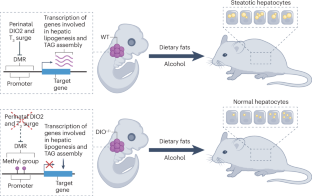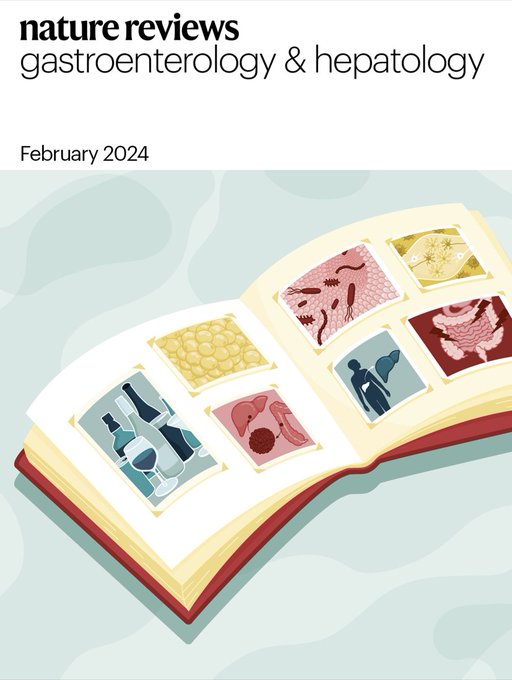甲状腺激素和拟甲状腺激素对肝脏的作用
IF 45.9
1区 医学
Q1 GASTROENTEROLOGY & HEPATOLOGY
引用次数: 0
摘要
甲状腺激素(三碘甲状腺原氨酸和甲状腺素)对肝脏和全身的新陈代谢平衡至关重要。下丘脑-垂体-甲状腺轴的失调会导致肝脏代谢紊乱,影响脂质代谢、葡萄糖调节和蛋白质合成。此外,循环和肝内甲状腺激素浓度的降低会诱发脂肪毒性、炎症和纤维化,从而增加代谢功能障碍相关性脂肪性肝病的风险。在临床前和临床研究中,甲状腺激素可改善肝脏代谢疾病,这促使人们开发了以THRB(肝脏中最主要的甲状腺激素受体同工酶)和/或肝脏本身为靶点的甲状腺激素模拟物,以更有选择性地激活肝脏甲状腺激素调节的代谢途径,同时减少主要表达THRA的组织(如心脏和骨骼)的甲状腺毒副作用。Resmetirom是一种具有肝脏和THRB选择性的拟甲状腺药物,最近成为美国食品及药物管理局批准的首个治疗代谢功能障碍相关性脂肪性肝炎(MASH)的药物。因此,更好地了解甲状腺激素和拟甲状腺激素在肝脏中的代谢作用是非常及时和具有临床意义的。在此,我们将介绍甲状腺激素在正常肝功能和MASH发病机制中的作用,以及用甲状腺激素补充剂或拟甲状腺药物治疗MASH患者时可能出现的一些潜在临床问题。本文章由计算机程序翻译,如有差异,请以英文原文为准。


Actions of thyroid hormones and thyromimetics on the liver
Thyroid hormones (triiodothyronine and thyroxine) are pivotal for metabolic balance in the liver and entire body. Dysregulation of the hypothalamus–pituitary–thyroid axis can contribute to hepatic metabolic disturbances, affecting lipid metabolism, glucose regulation and protein synthesis. In addition, reductions in circulating and intrahepatic thyroid hormone concentrations increase the risk of metabolic dysfunction-associated steatotic liver disease by inducing lipotoxicity, inflammation and fibrosis. Amelioration of hepatic metabolic disease by thyroid hormones in preclinical and clinical studies has spurred the development of thyromimetics that target THRB (the predominant thyroid hormone receptor isoform in the liver) and/or the liver itself to provide more selective activation of hepatic thyroid hormone-regulated metabolic pathways while reducing thyrotoxic side effects in tissues that predominantly express THRA such as the heart and bone. Resmetirom, a liver and THRB-selective thyromimetic, recently became the first FDA-approved drug for metabolic dysfunction-associated steatohepatitis (MASH). Thus, a better understanding of the metabolic actions of thyroid hormones and thyromimetics in the liver is timely and clinically relevant. Here, we describe the roles of thyroid hormones in normal liver function and pathogenesis of MASH, as well as some potential clinical issues that might arise when treating patients with MASH with thyroid hormone supplementation or thyromimetics. Thyroid hormones, triiodothyronine and thyroxine, are vital for metabolic homeostasis, and regulate essential hepatic functions. This Review summarizes the current knowledge of the role of thyroid hormones in the liver and examines the development of thyromimetics for liver disease.
求助全文
通过发布文献求助,成功后即可免费获取论文全文。
去求助
来源期刊
CiteScore
52.30
自引率
0.60%
发文量
147
审稿时长
6-12 weeks
期刊介绍:
Nature Reviews Gastroenterology & Hepatology aims to serve as the leading resource for Reviews and commentaries within the scientific and medical communities it caters to. The journal strives to maintain authority, accessibility, and clarity in its published articles, which are complemented by easily understandable figures, tables, and other display items. Dedicated to providing exceptional service to authors, referees, and readers, the editorial team works diligently to maximize the usefulness and impact of each publication.
The journal encompasses a wide range of content types, including Research Highlights, News & Views, Comments, Reviews, Perspectives, and Consensus Statements, all pertinent to gastroenterologists and hepatologists. With its broad scope, Nature Reviews Gastroenterology & Hepatology ensures that its articles reach a diverse audience, aiming for the widest possible dissemination of valuable information.
Nature Reviews Gastroenterology & Hepatology is part of the Nature Reviews portfolio of journals.

 求助内容:
求助内容: 应助结果提醒方式:
应助结果提醒方式:


